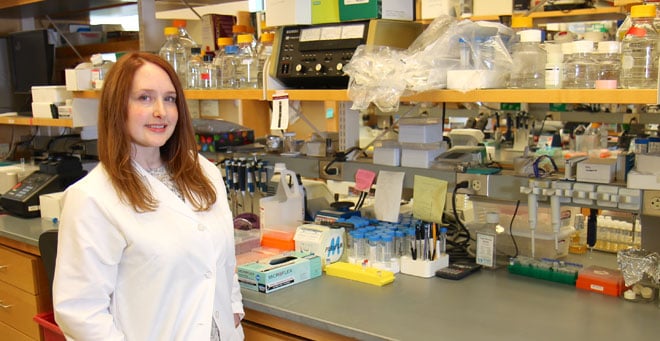 |
|
| Cara Weismann, PhD |
Cara Weismann, PhD, will unify her love of science with her passion for communication and collaboration when she begins a fellowship sponsored by the American Association for the Advancement of Science this month. A 2014 graduate of the Graduate School of Biomedical Sciences who studied in the lab of Miguel Sena Esteves, PhD, associate professor of neurology, Dr. Weismann will learn first-hand about policymaking and implementation at the federal level.
“Growing up, my family encouraged us to be the change we wanted to see in any problem we faced. We learned that we had the power within us to create good in the world,” said Weismann, assistant professor of nursing and a postdoctoral associate in the lab of Sean Ryder, PhD, associate professor of biochemistry & molecular pharmacology. “I am passionate about assuring that the pursuit of science is a sustainable, free from wrongdoings, financially healthy, and well understood and supported by the community at large.
The AAAS, which has a mandate to advance science and serve society, sponsors yearlong Science and Technology Policy Fellowships in the executive, legislative and judicial branches of the federal government. Its aim is to foster evidence-based policy and practice by engaging scientists, social scientists, medical professionals and engineers from a broad range of disciplines, backgrounds and career stages to apply their knowledge and analytical skills for well-informed policies, regulations and programs, and to build leadership capacity for a strong science and technology enterprise that benefits all people.
Weismann will do her fellowship at the National Institutes of Health’s National Human Genome Research Institute in the Division of Policy, Communications and Education, with division director Laura Rodriguez, PhD, serving as her mentor. Among other tasks, the division is responsible for informing Congress and other agencies about topics related to human genome research. Weismann is the first UMMS alum to receive an AAAS Science and Technology Policy Fellowship.
Pursuing the fellowship was a logical next step in Weismann’s career. While a PhD student at UMMS, she honed her communication and collaboration skills through extensive campus involvement that allowed her to interact with a range of people and professions. Weismann served as the UMMS student trustee on the UMass Board of Trustees (the only GSBS student to be elected to this position); served on the UMMS liaison committees for interprofessional curriculum and medical education accreditation self-study task force; helped create the governing documents for the UMMS Student Government Alliance; and co-founded the Interprofessional Biomedical Management Course Development committee with fellow MD/PhD students, and GSBS Cares, the graduate school’s community service committee. She also served on the Graduate Student Body Committee successively as first-year representative, community service chair and president. In recognition of her collaborative efforts, Weismann received GSBS student awards in leadership and community service and then became an assistant professor in the Graduate School of Nursing in 2016.
“As a student, I was given a lot of opportunities to enhance the educational experience,” said Weismann. “As a postdoc, I wanted to continue to give back in a meaningful way.” She also sees continued service as a means of paying back the value of her public education.
In addition to being a bench scientist, Weismann has considerable industry experience. Prior to pursuing her doctoral research in neurology and gene therapy, she worked for more than six years as an analytical chemist for a pharmaceutical company and as a manager of business development for a contract research organization. This fellowship will allow her to explore roles in science that she hasn’t played and she hopes that her experience in academia and industry will enable her to make unique contributions.
“I am early enough in my career to understand the challenges in the scientific enterprise and have enough experience to understand that real change takes time, compassion and compromise,” Weisman said. “I’m excited about the challenges ahead and look forward to learning how to work through the policy infrastructure and to give back to society the skills and expertise I have been developing throughout my career and education.”